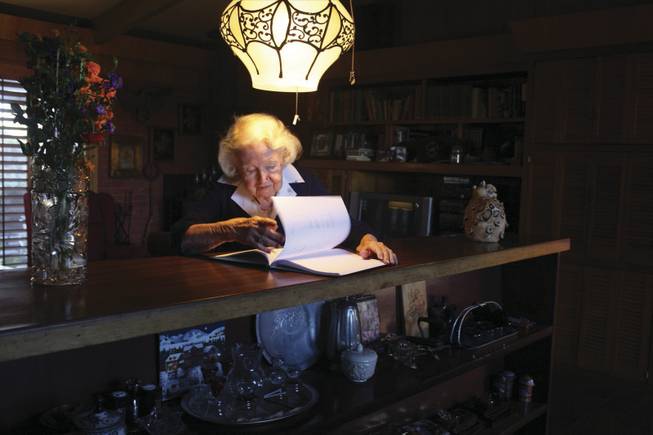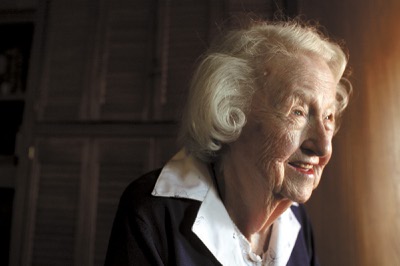
Gay Kauffman, 94, flips through a history book Thursday in her home. Kauffman, a lifelong Democrat and longtime Las Vegan, says the presidential election drew her interest more than that of any other year and reminded her of the nation’s past racial and economic struggles.
Friday, Nov. 7, 2008 | 2 a.m.
Before Tuesday, there was only one presidential election that had kept Gay Kauffman up until 2 in the morning: Dewey-Truman.

Gay Kauffman, 94, was pleased with the election's effect of prompting many young people to get involved. "It was great to see so many young people involved in something bigger than themselves, not worrying about their clothes, or -- what do you call it? -- their iPods or cell phones -- so superficial."
Audio Clip
- Gay Kaufman, 94, talks about watching Barack Obama's speech following his win in the 2008 Presidential election.
-
Audio Clip
- Kaufman talks about young people participating in the election.
-
Audio Clip
- Kaufman remembers discrimination on the Strip and hopes Obama's win can bring unity.
-
Sun Topics
History books snapped up that one after pollsters gave Republican nominee Thomas Dewey the edge against Democratic incumbent Harry Truman, prompting the Chicago Tribune to print the incorrect and now infamous headline “Dewey Defeats Truman.”
Of that evening in 1948, Kauffman, a lifelong Democrat, recalls: “We sat around the radio, some very Republican friends and I. Finally, I went to sleep.”
At 94, Kauffman was one of the oldest people in Clark County to cast a vote in Tuesday’s election, which she did by absentee ballot.
In fact, Kauffman’s birthday falls on Election Day every eight years, a symbol of sorts for a life of political involvement that spans eight decades and 14 presidents.
But this election not only drew her interest more than nearly all the rest. It also evoked images she has witnessed as the nation has churned through the past century.
When Lehman Bros. and other Wall Street firms failed in mid-September and pundits declared that the race then turned on what may be the greatest financial collapse since the Depression, Kauffman could recall people leaping from office building windows in downtown Chicago, where she lived during the 1930s.
When attacks against Barack Obama labeled him a socialist, she wondered: What was the Works Progress Administration, a federal program created in 1935 to put people back to work? For that matter, what are Social Security and Medicare?
It also reminded her of the McCarthy era, when careers and lives ended for people accused of Communism.
“That was a horrible thing,” she said, shaking her head in her 1958 country cottage of a house that is pleasingly out of step with the gritty Las Vegas thoroughfare on which it sits.
“Young people who heard this don’t know the history,” she added. “We have socialist institutions in the government, and they’re taking care of people who need it.”
But perhaps more than anything else, this election took her back through decades of moments, both personal and national, between blacks and whites.
Apart from a childhood in Chicago, the white woman has lived most of her life in the Southwest, including the past 45 years or so in Las Vegas.
At her wooden kitchen table, surrounded by wood-paneled walls, the surprisingly spry woman remembered staying at the Biltmore hotel off the Strip in the ’50s, before she and her now-deceased husband, Lewis, moved to the area full time.
It has stuck in her mind all these years that the black maid in the hotel with whom she struck up a conversation spoke of owning a house but not the land around it.
Kauffman saw the situation as evidence of unequal treatment for blacks. “They were pushing them around pretty good back then,” she said.
As the country changed, more images entered her memory: the first time she saw a black couple sitting in a restaurant, in Denver; the great number of white faces in the marches led by Dr. Martin Luther King Jr.
Volunteering at the Economic Opportunity Board here in Las Vegas, a program formed in the 1964 War on Poverty, she took care of elderly black women. Talking with them, she said, “I could see reasons for some black people to be so resentful.”
Kauffman supported Hillary Clinton at first, drawn to her intelligence, experience and the possibility of the first female president.
Kauffman has been on the vanguard herself, as when she ran a new newsletter at the Nevada Test Site, a military testing ground for nuclear weapons. Before that, in the 1950s, she was a reporter at the Santa Fe New Mexican, when few women worked in newspapers.
When she became a part of what the Obama campaign called a movement, she found it inspiring to see so many young faces on CNN in reports on spiking voter registration.
“I was very happy to see that happen ... It was great to see so many young people involved in something bigger than themselves, not worrying about their clothes, or — what do you call it? — their iPods or cell phones — so superficial.”
She applauds the changing Las Vegas Valley, with its high turnout of minority voters, now being called the main reason for Obama’s victory in Clark County.
“This is good. I think it’s more uniting.”
She won’t forget the night of Nov. 4, two days after her 94th birthday.
A smile crosses her lined face.
“All those people standing in Grant field, whites, blacks, Spanish people, they felt good together. They were hopeful. I sure hope it carries on.”

Join the Discussion:
Check this out for a full explanation of our conversion to the LiveFyre commenting system and instructions on how to sign up for an account.
Full comments policy